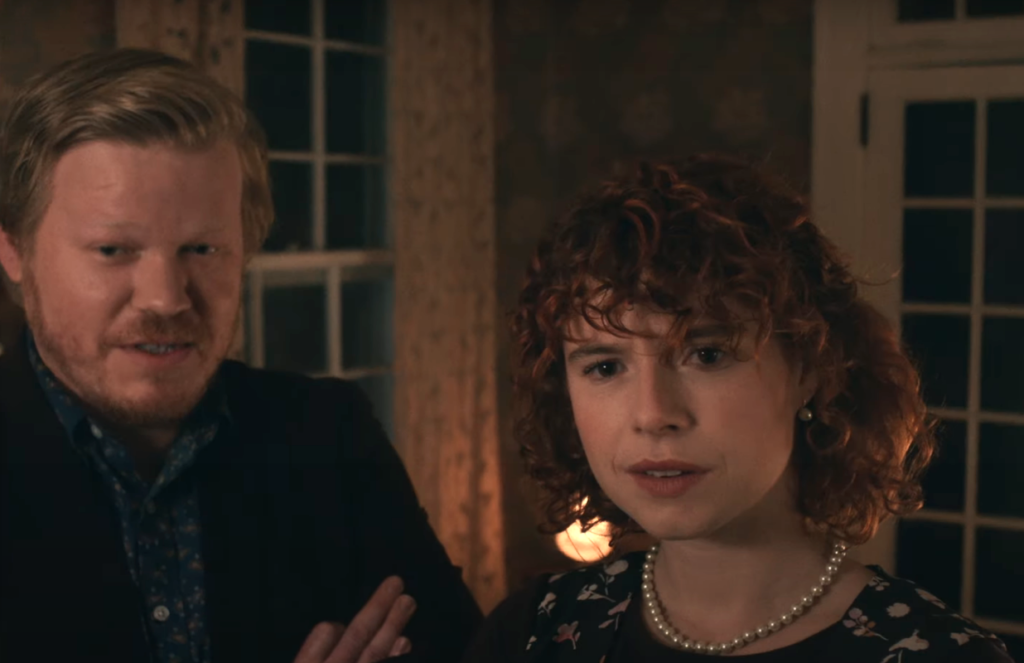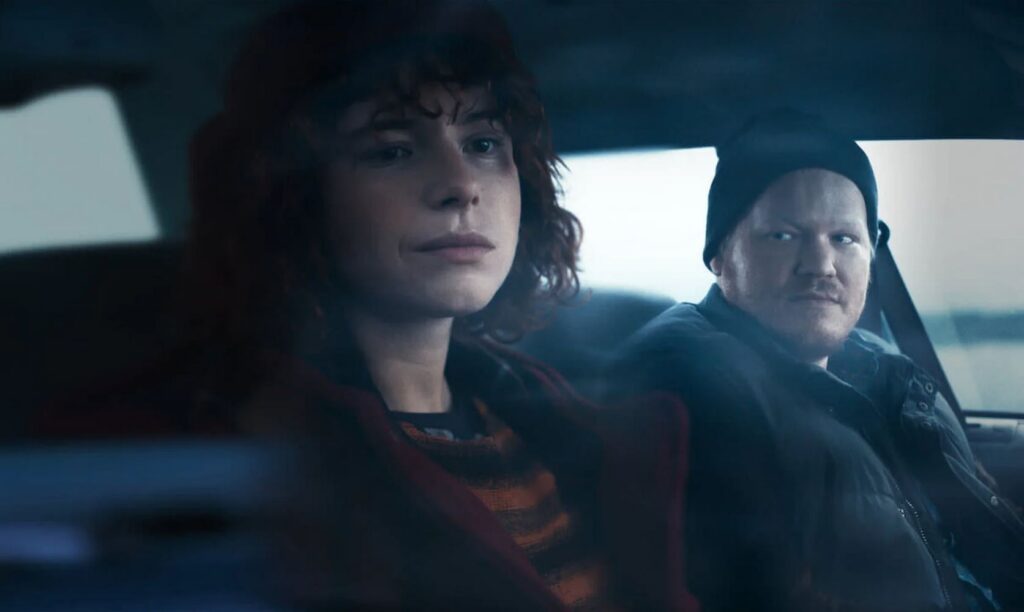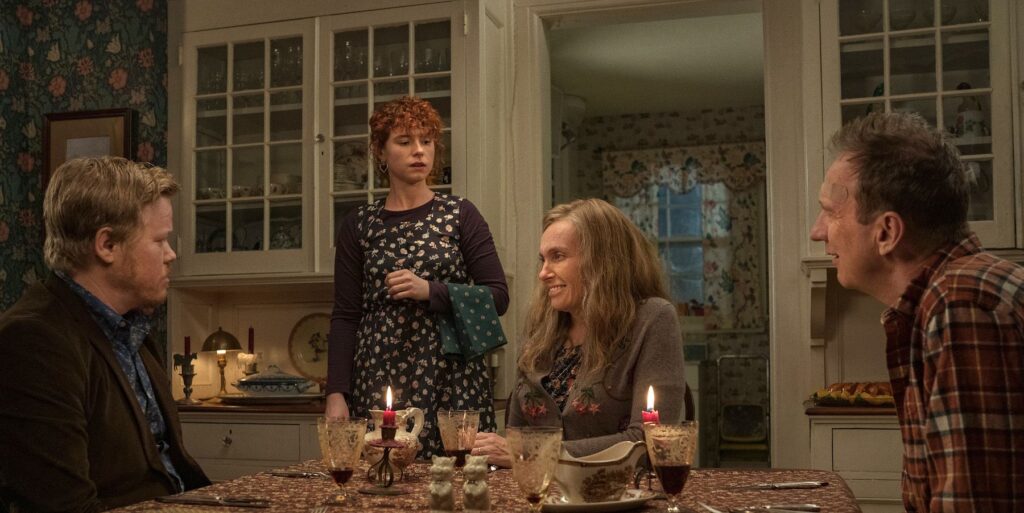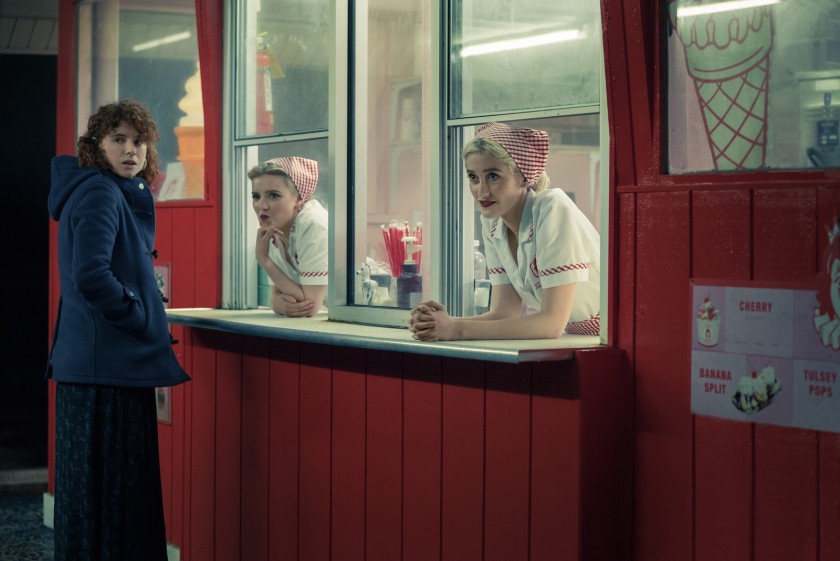
An extended, discursive, baffling game of Choose Your Own Metaphor, Charlie Kaufman’s I’m Thinking of Ending Things is a weighty treatise on the universal fear of loneliness. At least, I think it is. Maybe it’s a sad commentary on the inexorability of aging? I dunno. In one scene, the characters discuss the board game Trivial Pursuit, so perhaps it’s a valentine to one of that amusement’s classic categories, Arts & Literature; certainly it’s an erudite picture, given how frequently it name-checks writers like Tolstoy, Wilde, and Emerson.
Whatever his faults, Kaufman doesn’t make movies like anyone else. He also doesn’t seem to make movies that can be understood by anyone else. He’s blessed with such a fertile imagination, it’s almost like his films are acts of intellectual upheaval, as though he’s been demonically compelled to yank his ideas out of his brain and plunk them onto the screen. The human mind is a fragile and chaotic place, and so are his artistic creations, which are governed by passion and inspiration rather than order and logic. I’m Thinking of Ending Things is far from his best movie—that title belongs to either Being John Malkovich or Eternal Sunshine of the Spotless Mind, both of which he wrote but didn’t direct—but it’s arguably his most purely Kaufmanesque (though Synecdoche, New York might like a word). It waltzes along to its own syncopated rhythms, its synapses firing randomly, unable to or just uninterested in packaging its multitude of thoughts into a coherent story.
Does that sound appealing to you? It’s a sincere question. We try to assign objective binaries to movies—thumbs-up or thumbs-down, fresh or rotten—but more so than with most, your critique of I’m Thinking of Ending Things will hinge heavily on your personal tastes. Devotees of abstract cinema will likely be enraptured by its relentless invention; more literal-minded viewers will be exasperated by its opacity. Myself, I’m able to see #BothSides here. Kaufman’s commitment to his vision is undeniable, and I admire his willingness to experiment. At the same time, when a female character announces late in the film that she’s struggling to understand what’s happening… well, as the kids say these days, I felt seen.

That woman, played by Jessie Buckley (Wild Rose, Chernobyl), doesn’t seem to possess a consistent name (she’s credited as Young Woman); her boyfriend, Jake (an excellent Jesse Plemons), first calls her Lucy, so I will too, though one of the initial signs that something funny is going on occurs when she receives a phone call from “Lucy”. No matter. They’ve been dating for a few months, and he’s taking her to meet his parents, resulting in a long, snowy drive through an unspecified slice of rural America, the windshield wipers softly slashing through their sometimes-sweet, sometimes-stiff conversation. Jake seems nice enough, and he’s unusually attentive to his girlfriend’s studies. (She’s a biology student, at least until she isn’t.) He’s also broadly knowledgeable—rattling off a list of favorite musicals (Oklahoma! is his favorite), quoting authors like David Foster Wallace, correcting apocryphal tales about Mussolini, and constantly comparing life to art. He might remind you of a certain writer-director.
But Jake isn’t the only Kaufman surrogate on screen. Lucy, too, is plagued with the filmmaker’s signature insecurities, along with the niggling sensation that something in her reality isn’t quite right. As the title implies, she’s contemplating breaking up with Jake—not because he’s a bad guy, but because she inherently questions everything in her life, and she can’t help but wonder (in a staccato, ruminative voiceover) if there’s just no spark, no point. Like all of Kaufman’s characters, Lucy and Jake are both prone to internal torture and self-doubt, which may explain why Lucy, upon seeing a purported photo of Jake as a child on his parents’ living-room wall, can’t help but think it looks an awfully lot like her. In this particular iteration of existential anxiety, nobody on screen is John Malkovich, but everyone still seems to be Charlie Kaufman.
I’m getting ahead of myself. The most enjoyable stretch of I’m Thinking of Ending Things, which is also its most prosaic (remember what I said about tastes?), occurs shortly after Lucy and Jake arrive at his farmhouse. What ensues is a family dinner that is by turns playful, awkward, and lovely. It’s tempting to perceive Jake’s parents, winningly played by Toni Collette and David Thewlis, as crude stereotypes of small-town boobs, but there’s real affection in the way they gently interrogate Lucy and ply her with cringeworthy stories about their son. The sequence is also one of the few times that Kaufman cedes control to his actors, all of whom prove skilled at giving his dialogue weight; Plemons, in particular, is masterful for how he mingles pride with shame.

Jake’s discomfort is easily recognizable, but over time, the surrealism that permeates the film grows more pronounced. A washing machine clangs ominously, filled with sweatshirts we’ve seen elsewhere. A dog appears and disappears at random. Jake’s parents suddenly grow much older, then dramatically younger. The blizzard that merrily rages outside somehow begins to fall above the basement stairs. In some ways, the editing and sound design approximate the rhythms of a horror movie—the casting of Collette, whose terrifying performance in Hereditary still reverberates, contributes in this regard—but Kaufman doesn’t really want to scare you. He wants to prod you, to encourage you to examine your life, to contemplate your relationships with art, with others, with yourself.
He mostly fails. I’m Thinking of Ending Things, which is based on a book by Iain Reid, bustles with narrative strangeness and conceptual innovation, but it has no real gravity, no emotional center that allows its ideas to land with any force. This isn’t about me feeling overwhelmed by oddness; Kaufman’s last picture, Anomalisa, was in some ways a far weirder production—recall that all but two of its puppet characters, regardless of age or gender, spoke in the voice of Tom Noonan—but it nevertheless exhibited a thematic specificity, along with a tender romantic core.
This movie has neither. Instead, it prefers to wander, bombarding you with digressions and references that lack meaning or attachment. Its scope is simultaneously narrow—roughly one quarter of the film transpires in Jake’s car, chronicling his increasingly bizarre chats with Lucy—and very broad. Kaufman regularly abandons his principals for scenes with an elderly janitor (Guy Boyd) at Jake’s high school, meandering sequences whose purpose is mysterious. He also occasionally slips inside a different movie entirely, a conventional love story about a waitress (Colby Minifie) struggling to pursue her dreams. (The directorial credit applied to this fake feature results in a sharp laugh.) There are animated jingles, hallucinated pigs, and countless pop-culture allusions; at one point, after spying a book of Pauline Kael essays in Jake’s bedroom, Lucy recites verbatim Kael’s review of A Woman Under the Influence.

Why? What does that mean? I’m sure that I’m simply supposed to search harder, but I’m Thinking of Ending Things seems to actively defy legibility, treating bewilderment as a basic artistic good. Maybe it is, and I’m just not smart enough—or too pigheaded, as it were—to get it. But while I appreciate a winking reference as much as the next cinephile—I confess to perking up when Jake, for reasons far beyond my comprehension, inexplicably transformed into Russell Crowe’s character at the end of A Beautiful Mind—such litanies of quotation feel pointless when they aren’t tethered to concrete characters. (No doubt there are other shout-outs that I missed, but relying on your audience to grasp the full breadth of your literary knowledge—think of it as Ready Player One: Grown-Up Edition—is a dangerous proposition.)
Yet with all that said, there are moments of pure filmmaking here that are too damn impressive to be outright dismissed. Jake and Lucy’s late-night journey to an ice-cream shop called Tulsey Town doesn’t make a lick of sense, but the location itself is mesmerizing, a brightly lit, purgatorial oasis amid a dark, wintry world. And in the movie’s final stretch, Kaufman draws upon a certain lyricism, delivering an enchanting musical sequence that bursts with expressive energy. It’s still mystifying, but it’s plenty watchable.
I can’t quite ascribe that sentiment to the film as a whole, which remains stubbornly shrouded in enigma to the end. At one point, Lucy analogizes herself to a wind blowing through a house, and through Jake’s parents. It’s a vivid metaphor, but it also speaks to this movie’s emptiness and impermanence. I’m Thinking of Ending Things is a laudable effort; it’s ambitious, provocative, and above all, original. But it doesn’t last. Its wind blows through you swiftly—disturbing your body, but never rustling your soul.
Grade: B-
Jeremy Beck is the editor-in-chief of MovieManifesto. He watches more movies and television than he probably should.

Ugh, I’m glad you affirmed my exact reaction of “welp, guess I’m not smart enough to understand this.” Even after reading Kaufman’s “explanation” of the movie in an article, I get it but don’t GET it. I watched Adaptation right after, and this quote from Kaufman stuck out: “Sir, what if the writer is attempting to create a story where nothing much happens? Where people don’t change, they don’t have any epiphanies, they struggle and are frustrated and nothing is resolved. More a reflection of the real world.” That’s just what this movie felt like!! But mostly I just felt dumb 🙂